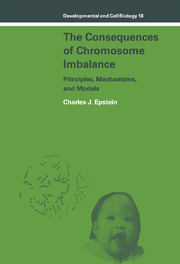Book contents
- Frontmatter
- Contents
- Preface
- Glossary
- PART I INTRODUCTION
- PART II CLINICAL OBSERVATIONS
- 2 The differentiability and variability of phenotypes
- 3 The partitioning of phenotypes
- PART III THE THEORETICAL MECHANISMS AND ISSUES: THE PRIMARY AND SECONDARY EFFECTS OF ANEUPLOIDY
- PART IV EXPERIMENTAL SYSTEMS FOR THE STUDY OF MAMMALIAN AND HUMAN ANEUPLOIDY
- PART V THREE MAJOR CLINICAL PROBLEMS OF HUMAN ANEUPLOIDY
- PART VI CONCLUSION
- Appendix: Standard karyotypes of man and mouse and human cytogenetic nomenclature
- References
- Index
2 - The differentiability and variability of phenotypes
Published online by Cambridge University Press: 14 October 2009
- Frontmatter
- Contents
- Preface
- Glossary
- PART I INTRODUCTION
- PART II CLINICAL OBSERVATIONS
- 2 The differentiability and variability of phenotypes
- 3 The partitioning of phenotypes
- PART III THE THEORETICAL MECHANISMS AND ISSUES: THE PRIMARY AND SECONDARY EFFECTS OF ANEUPLOIDY
- PART IV EXPERIMENTAL SYSTEMS FOR THE STUDY OF MAMMALIAN AND HUMAN ANEUPLOIDY
- PART V THREE MAJOR CLINICAL PROBLEMS OF HUMAN ANEUPLOIDY
- PART VI CONCLUSION
- Appendix: Standard karyotypes of man and mouse and human cytogenetic nomenclature
- References
- Index
Summary
From a purely intellectual point of view, it would have been most satisfying to have first generated a broad theoretical approach to understanding the effects of aneuploidy and then to have matched the theory against clinical and experimental observations. These observations would thus become a test of the predictive qualities of the theory. However, biological hypotheses and theories are rarely formulated in a vacuum, without a background of observations, and it would be misleading to suggest that such is the case for the issues under discussion here. Therefore, I have chosen to begin the body of this work with a survey of certain aspects of clinical cytogenetics. This survey is not intended to be comprehensive or exhaustive, either in considering and discussing all clinical syndromes associated with human chromosome abnormalities, in analyzing every aspect of those syndromes that are considered, or in considering and listing every reported case. Rather, the intent is to determine what general principles, if any, can be deduced from an examination of a wide range of representative clinical data and thereby to learn what specific issues should be addressed by a theoretical formulation of the effects of aneuploidy. Full descriptions of the phenotypes of individual clinical syndromes are contained in Grouchy and Turleau (1984) and Schinzel (1983).
In virtually all instances, the descriptions of syndromes are, unfortunately, couched almost entirely in morphological terms.
- Type
- Chapter
- Information
- The Consequences of Chromosome ImbalancePrinciples, Mechanisms, and Models, pp. 13 - 21Publisher: Cambridge University PressPrint publication year: 1986
- 3
- Cited by



